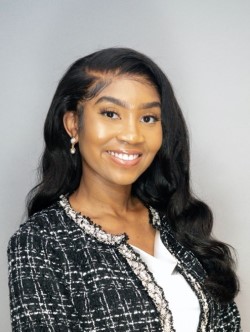by Carmen-Rose Madiebo
It's likely that anyone you talk to will admit to feeling lost in life at one point. For many of us, our youth holds so many stories of feeling confused. College years are the first time that most people stray from the safety of their parents and rely on themselves for all of their responsibilities. For some, this can be a daunting task, but others persevere through the unknown future that is school.
My journey took me to Ross University, a medical school on a small island in the West Indies called Dominica. I was so eager to begin! But I quickly learned I would have to endure many ups and down on my new adventure.
Soon, Hurricane Maria, a category 5 storm, swept through the Caribbean and demolished Dominica with its violent 250-mph winds. My school and many homes and businesses were wiped out, along with my nerves and those of faculty members, countless island residents, and my fellow students. Traumatized by the devastation, I was lost.
Shattered glass, splintered wood, uprooted trees, mudslides, and flooding were everywhere. We were without running water or electricity for over a week. After struggling by myself in the beginning of Maria's aftermath, I finally reached out for help, seeking solace from mentors, therapists, and other support groups. We had all lost an incredible amount to the storm. These incredible people and the community they formed were the foundation on which me and so many other students regained our footing. Thankfully, with the help of more dynamic, compassionate, and competent mentors, I resumed my medical schooling in Barbados as well as the United States.
My adventure was nowhere near over though. I had not yet discovered that a part of me was now strong enough to empower others who had also endured traumatic loss, perhaps giving them the confidence to persevere as well.
I was back in the United States one late night during a 15-hour shift at the ER when a young woman was admitted in a state of trauma and disorientation. I will never forget the terror in her voice. “Where am I? Please; don't let them find me!” she pleaded to anyone who would listen.
Volunteering to acquire the woman's history, I quickly realized that my 26-year-old patient was lost. She had traveled for a “work opportunity.” Lured into a trap, she was kidnapped and then exploited by her captors for human trafficking purposes. Thankfully, she had taken a window of opportunity to escape but had been hit by a car while running away; a bystander called 911 and I was the first person she'd had a real conversation with in months.
Her reality was gut-wrenching, and it broke my heart. But I knew this woman needed support. While dissimilar to what I endured in many ways, her hardship reminded me when I had been lost, afraid, and—finally—found. I wanted to be for her who the mentors had been for me because being lost is more than just a literal sense of “do I go left or right”? It's about finding your way during a time of great despair.
I provided her immediate comfort and assured her that I would not let anything else happen to her. After that, I checked on her frequently throughout her admission, making sure she was eating and that she knew she always had me to talk to if she wanted. Finally, I worked alongside the physician and case manager to find her temporary shelter while her family was being located.
It was a very sad but very rewarding situation during which I was proud to pay forward a small fraction of what my support system had given me. Life brings numerous hiccups and difficulties. Particularly during medical school, each step has presented some sort of new challenge, something I had never seen nor dealt with before.
That's how I know that mentors are a crucial resource for all medical students. A support system is integral in maintaining mental health. Additionally, teachers and mentors have a wealth of knowledge to share, and partnering with them will not only give students insights and help them learn valuable lessons, but also set them on the path to become mentors themselves. Thus, the circle of support will continue to strengthen as time goes on.
Formal mentorships should be a part of every medical school curriculum and offered to all students.
After Hurricane Maria, I was lost. Thanks to my mentors, I found my way. My own positive experiences have inspired me to do the same for others. Whether colleagues or patients, I am here to hold their hand and walk with them through the maze of life, hopefully helping them find their way back home.

Carmen-Rose Madiebo
Ross University School of Medicine
Graduating Class of 2023
Back to the March 2023 issue of ACP IMpact

